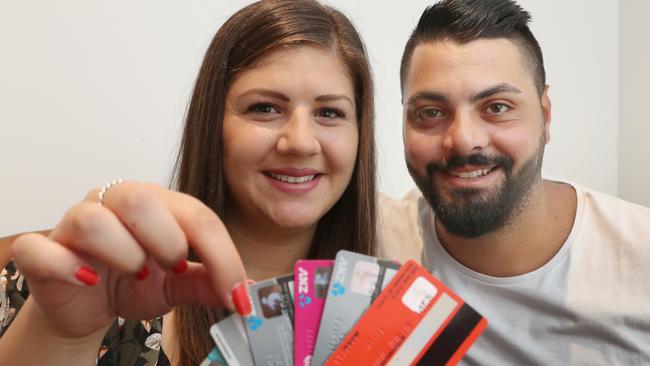Barefoot Investor: To prevent financial ruin, cut up your credit card
This exclusive edited extract is No. 6 from The Barefoot Investor for Families: Your kids must promise to never, ever get a credit card. And the best way to help them avoid ruining their financial futures is to cut up your own, writes the Barefoot Investor.
Barefoot Investor
Don't miss out on the headlines from Barefoot Investor. Followed categories will be added to My News.
Credit cards can quickly get you tangled up in financial ruin.
Scott Pape’s new book, The Barefoot Investor for Families, explains how to set your kids up for life.
The book takes you through the Barefoot Ten: Ten money milestones that every kids should check off before they leave home.
This exclusive edited extract is No. 6 from the Barefoot Ten: your kids must promise to never, ever get a credit card.
CREDIT CARD CHANGES COMING YOUR WAY IN 2019
AUSSIES USE CREDIT TO GET THROUGH FESTIVE SEASON
WHY YOUR KIDS NEED PLASTIC SURGERY
I tell you, in the 15 years or so I’ve been Barefoot I’ve never had anyone come back to me and say: ‘Mister Barefoot, the worst thing I ever did was follow your advice and pay off my credit card. I totally regret that.’
Never. Ever.
That’s because credit cards are a total rip-off.
However, the banks are actively targeting your teens, trying to sign them up.
The banks understand that for most people a credit card is like buying a puppy. Once you get it, you’re very unlikely to give it up.
It can bite you, pee all over your couch, dump a turd in the middle of your lounge room, and you’ll still keep it.
And that’s exactly why we’re going to make sure your kids never get one in the first place.
I’m not going to take a backward step — I’m going to fight dirty.
Seriously, your kids’ financial confidence is at stake.
The sixth challenge of the Barefoot Ten is for your teen to ‘promise to never, ever get a credit card’, and by the time you’ve finished this money meal your kids will see not having a credit card as a reverse status symbol.
They’re so smart they don’t need one.
This Money Meal is one your kids will remember forever.

THE CREDIT CONFIDENCE CRUNCH
In the past seven years I’ve dealt with hundreds, if not thousands,
of young people.
Here’s what I’ve learned:
Most teenagers don’t have much confidence when they finish high school.
Especially teenage girls. Especially when it comes to money.
So let me tell you what typically happens next.
When you turn 18, the world is waiting to reinforce your belief that you’re no good with money.
Advertisers spend billions of dollars encouraging you to buy stuff you don’t need, to impress people who (you’ll eventually come to understand) don’t really care about you.
Social media makes you feel like a loser if you’re not living an expensive Instagram-filtered life.
But thankfully your bank sees your potential: they’ve decided to entrust you with their precious money, in the form of a credit card. Just like a real adult!
And then, like a drug dealer, they begin upping the limit.
And within a few years your negative beliefs have become a self-fulfilling prophecy:
‘See, I am a loser with money! It must be true! Just look at my credit card statement!’
And then these negative beliefs feed on themselves. They colour your entire life. They keep you stuck in jobs you’ve outgrown, in relationships that aren’t good for you. And life passes you by.
But it doesn’t have to go this way.
If your child is already a teen, you might be wondering if it’s too late to make a difference.
Here’s the truth:
If your teen is still living at home with you, you’ve got more influence than you know. After all, there are things that your parents have said and done that stick with you to this day, right?
Well, this week we’re going to create some money memories for your kids …
MAKE A STATEMENT
At the next Money Meal, I want you to set the scene.
Begin by explaining what credit is (because kids aren’t taught about money in school, you may find they have no idea).
What your kids need to know is that while products change — from credit cards, to store credit, to Afterpay, to payday predators like Nimble — the game hasn’t changed since Al Capone was a boy: the aim of credit providers is to turn your money into theirs.
The key point you want to communicate is: ‘Credit is borrowing money to buy things. And the interest you pay makes everything you buy more expensive.’
Okay, so now it’s time to make it real for your kids.
If you have a credit card, I want you to bring your statement to this week’s Barefoot Money Meal.
It’s ‘show and tell’ time.
Get your credit card statement, grab a highlighter and circle the ‘minimum payment due’.
Notice that the bank has intentionally bolded this so it looks like you only need to pay the interest? In fact, that’s 2.5 per cent of the outstanding balance. The bank only wants you to pay the minimum because, if you do, you’ll end up paying them nearly $5000 in interest over the life of the loan!
Ask your kids: can you now see how credit cards make everything more expensive?
Then give your them some context:
The average person in Australia has a $4400 balance on their credit card. The banks encourage us to only make the minimum repayments … because if we do it’ll take 31 years to pay off, and cost $14,900 in interest.
Then circle back around and give your kids even more context:
‘Jane, that means that if you were to have the average credit card now, and pay the minimum each month like most people do, you’d be MY AGE by the time you paid it off. As in nearly dead! And you would have spent the equivalent of our car on interest! And you’d have absolutely nothing to show for it!’ Let that
sink in.

THE ULTIMATE REWARDS PROGRAM
Part of the magic of the Barefoot Money Meals is that you get to interrupt the pattern of regular dinners.
Remember, you’re competing against sophisticated marketers who have been gaming teenagers for generations, so a lecture on the dangers of credit isn’t going to work … no matter how much you try to jazz it up.
Actions speak louder than words. So instead, at this Money Meal, you’re going to do something they’ll never forget.
You’re going to blend your credit card.
Here’s you: … Blend my card? Like … in a blender?
Here’s me: Yep. Cards in. Lid on. Thirty seconds.
Here’s you: But I don’t want to blend my credit card! I pay it off in full each month and I get rewards! Besides, it’s fine to use one as long as you’re smart about it.
Here’s me: This isn’t about you. It’s about setting a good example for your kids, who probably don’t have your monk-like resolve when they’re being marketed to 18 hours a day.
Besides, credit card rewards systems are, like, so 2009.
It’s no secret that the banks have been playing hokey-pokey with the value of rewards points for years — but right now it’s just getting ridiculous.
Case in point: over the past 12 months, the banks have been secretly shutting down, or radically reducing, the value of their rewards systems.
According to financial comparison site Mozo, the banks have yanked the value of their rewards points, on average, by a staggering 96 per cent since 2016.
The value of the points — not to mention the restrictions on redeeming them — is a joke.
So, as an alternative I’m going to give you the ultimate rewards program, one that’s available to you right now.
You don’t have to bother playing the rewards point shuffle. You don’t have to worry about innocently missing a repayment and being slugged with back interest for the month. You don’t get slugged with a hefty annual fee.
So what is this platinum-titanium rewards program?
It’s you modelling good habits for your kids.
They’ll grow up knowing Mum and Dad don’t do credit cards.
They’ll grow up watching their parents pay their own way, with THEIR OWN MONEY.
They’ll grow up knowing that their parents are powerful money managers.
You’ll make them see that not having a credit card is a reverse status symbol: you’re so smart you don’t need one.
‘In our family, we earn interest, we don’t pay it.’
Now that is the ultimate reward.

OPEN ONLY IN CASE OF EMERGENCY
Newlyweds Lucy and Izzy Mehmet applied for their first credit card to get a deal on travel insurance for their overseas honeymoon.
But both agree you need to be alert of the pitfalls of owning one.
“We definitely don’t rely on our credit card, as money you don’t have should not be spent,” Ms Mehmet said.
While the couple agreed the card shouldn’t be used willy nilly, it was handy to know it was there if needed.
“We use our credit card in case of an emergency for bills we can’t afford to pay at the time.”
ALANAH FROST
The Barefoot Investor For Families, by Scott Pape, is published by HarperCollins Australia and available now
Originally published as Barefoot Investor: To prevent financial ruin, cut up your credit card


